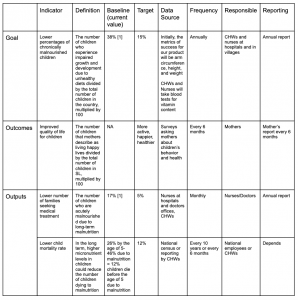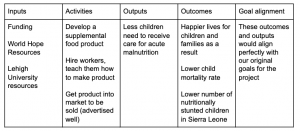M&E Plan
Logic Model
Assumptions:
- Children will continuously eat enough of our therapeutic food to improve their nutrition levels
Social Return on Investment (SROI)
Health spending encompasses 9% of Sierra Leone’s national budget, and mothers and children under 5 receive free healthcare. Additionally, Sierra Leone has one of the higher GDPs of underdeveloped countries, but is lower in terms of health, education, and standard of living. If our product sold at just 500 units/day in the beginning, this would impact approximately 167 children under the age of 5. [2] With that being said, SROI does not include saving the government money. Our product aims to improve the micronutrient levels in children and limit the number of chronically malnourished kids. Malnutrition causes issues with a child’s cognitive development, so if we can impact around 150 children’s nutrition levels, those 150 children will have more of an ability to learn and succeed in school and eventually contribute to the economy. Well nourished children are also less susceptible to disease because their immune system are more healthy, so our product could impact savings to health services in Sierra Leone. Because families are not responsible for paying for their child’s healthcare when they are under the age of 5, they are not necessarily saving money they would spend on healthcare. Our product will be at least five times cheaper than other therapeutic foods, like Bennimix, but because they are not responsible for paying for healthcare until after their child is over 5, it cannot be used to truly quantify the success of our product. It is difficult to give a value of our SROI ratio, but it is something we will continue to research and try to quantify.
References:


